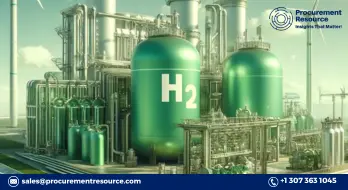Amidst Surging Energy Demand, ExxonMobil Fears Falling Short of Paris Agreement Considering Carbon Emissions

ExxonMobil, a leading US oil major, has expressed concerns that global endeavors to reduce emissions might fall short of the Paris Agreement's objectives, primarily due to rising energy demands from developing countries. In its Global Outlook, ExxonMobil predicts that energy-related CO2 emissions will peak at over 34bn metric tonnes this decade, eventually dropping to 25bn t by 2050. Achieving a 25% reduction in emissions during this period, especially with the global economy projected to double, is a significant challenge.
Request Access For the Latest Price Trends of Hydrogen
However, the company emphasizes that even these efforts might not be enough to limit global temperature rises below 2°C. For context, the Intergovernmental Panel on Climate Change's Lower 2-degree scenarios necessitate emissions to decrease to approximately 11bn t by 2050. ExxonMobil acknowledges the ongoing energy transition but points out its inadequacy in meeting society's net-zero goals. The company's outlook suggests that by 2050, oil and gas will still cater to 54% of global energy requirements.
Although the use of oil is predicted to decrease in personal transportation, it will remain indispensable for industrial processes and heavy-duty transport sectors, including shipping, aviation, and long-haul trucking. Even if all new passenger cars sold by 2035 were electric, the oil demand in 2050 would likely match 2010 levels, standing at 85mn b/d.
Renewable energy sources like wind and solar are projected to account for 11% of global energy by 2050, a fivefold increase from today. Other sustainable alternatives, including biofuels, carbon capture, hydrogen, and nuclear energy, are also expected to play crucial roles in the energy matrix.
It's worth noting that ExxonMobil shareholders recently voted against a proposal to set a medium-term reduction target for Scope 3 end-use emissions, which constitute the bulk of the company's carbon footprint. Nevertheless, ExxonMobil has been amplifying its investments in low-carbon initiatives, allocating approximately $17bn for such projects through 2027, even as it aims to increase oil and gas production.
Read More About Hydrogen Production Cost Reports - Get Free Sample Copy in PDF
According to the article by Procurement Resource, ExxonMobil's Global Outlook underscores the challenges in meeting the Paris Agreement's targets, especially with rising energy demands from developing nations. While the company acknowledges the ongoing energy transition, it emphasizes the continued relevance of oil and gas in the future energy mix. Despite the company's increased investments in low-carbon initiatives, the scale of the transition remains a concern. The global community faces a daunting task, requiring more aggressive measures to achieve the desired emission reductions and combat climate change.




